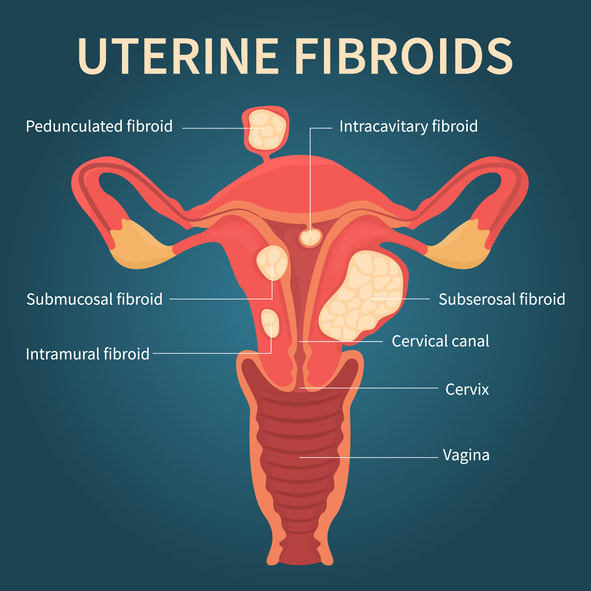Manhattan’s Source for Uterine Fibroid Treatment
Answering Your Questions About Uterine Fibroids
Uterine fibroids are all too common. Despite this, plenty of people struggling with this condition don’t know their treatment options. At Manhattan Reproductive Surgery Center, we’re committed to educating women with fibroids about their options. We help patients from the New York City Metro Area, Southern New Jersey, and Connecticut find relief. Read up on our frequently asked questions, or reach out to us with your concerns.
What Are Uterine Fibroids?
Uterine fibroids are tumors that grow into the wall of the uterus. Fortunately, almost all fibroids are noncancerous.
Who Is Most Likely to Develop Fibroids?
This condition affects up to 50 percent of all women. However, fibroids are most common in women in their 30s and 40s. Some studies have also found that fibroids are more prevalent in African-American women and those with a family history of the condition.
What Are the Symptoms of Fibroids?
Symptoms of uterine fibroids vary from person to person. Pelvic pain, heavy bleeding during periods, frequent urination, bloating, lower back pain, and pain during sexual intercourse are all common signs of this condition.
How Are Fibroids Diagnosed?
You can know for sure whether you have fibroids with a pelvic exam. We may have you undergo an ultrasound so we can get a detailed picture of your uterus and pelvic area.
Can Fibroids Turn into Cancer?
Fibroids very rarely become cancerous. Less than one in every 1,000 women will develop a cancerous fibroid. Current research suggests that fibroids do not increase your risk of cancer either.
What Causes Fibroids in Women?
While we don’t know the exact cause of fibroids, we suspect that high levels of estrogen increase the risk of developing these growths. Fibroids may also have genetic causes.
What Are the Types of Fibroids?
Fibroids are classified by their location on the uterus. You may be dealing with any of these four types of fibroid:
- Subserosal: Subserosal fibroids develop on the outside of the uterine wall.
- Submucosal: These fibroids grow below the uterine tissue and can sometimes enter the uterine cavity.
- Intramural: Intramural fibroids grow inside the uterine wall
- Pedunculated: This type of fibroid develops on stems attached to the uterine wall.
Are There Foods I Should Avoid?
Although we’re still not sure which foods cause fibroids to grow, we have seen links between eating lots of ham and red meat and the risk of developing fibroids.
How Painful Are Fibroids?
Most people with fibroids experience few to no symptoms. However, patients can occasionally experience fibroid cyst pain. Our patients typically describe the pain as a dull pressure in the pelvic region.
What If I’m Pregnant?
Fibroids don’t tend to pose a risk to the pregnancy. Most women can still successfully become pregnant despite fibroids. However, you may be at increased risk of minor complications such as a Cesarean section birth, breech presentation, and premature birth.
Can Fibroids Cause Infertility?
In the vast majority of cases, fibroids do not cause infertility. However, they can make conception more difficult as they may block the fallopian tubes and minimize the space within the uterus.
When Should I Seek Treatment for Fibroids?
You do not need to seek treatment for fibroids unless you have noticed discomfort or painful symptoms. Many patients don’t experience symptoms at all. However, the team at MRSC can help treat fibroids should they begin to give you trouble.
What Kinds of Treatment Option Are There?
Although the cause of fibroids is unclear, we have numerous treatment options to successfully remove fibroids. We may prescribe medication or suggest a surgical procedure to eliminate the pain and discomfort. Here’s a brief overview of treatments you can expect:
- Minimally Invasive Laparoscopy – Laparoscopic surgery or laparoscopy, is an outpatient procedure that places a narrow fiber-optic scope through a small incision made into the navel of the female patient. Once inside, the device can thoroughly detect the presence of any cysts, fibroids, adhesions, or damages to the reproductive organs and allow doctors to advise an immediate plan to remedy the issues.
- Medication: Our team may use medications to shrink the fibroids or help you deal with the pain until surgery.
- Myomectomy: This procedure allows us to remove fibroids from the uterine wall. We may complete a full or partial removal.
- Uterine Artery Embolization: This procedure is done by Radiologists and not reproductive surgery specialists; therefore we do not recommend this procedure for anyone who wants to maintain their fertility now or in the future.
- Hysterectomy: This is an extreme procedure that we do not recommend or perform. However, you should only consider this procedure if you do not wish to have any more children.
Is Treatment Painful?
Treatment for fibroids should not be painful. While you may have some tenderness and discomfort while recovering from a hysterectomy, you shouldn’t find yourself in significant pain.
When Can I Return to Work?
Recovery will vary based on which treatment we deem best for you. Medications will not require any downtime, but a minimally-invasive surgery may require a few days of rest. Our team will make sure you have all the instructions related to recovery and getting back to work.
Can Fibroids Come Back?
Fibroids may eventually grow back after treatment. The only way to guarantee you stay free of fibroids in the future is by removing the uterus, but that is an extreme measure.
Get in Touch with Us Today
If uterine fibroids are causing you pain, don’t hesitate to reach out to the team at Manhattan Reproductive Surgery Center. We’re proud to help so many patients in the New York City Metro Area. Contact us today to set up your appointment.

